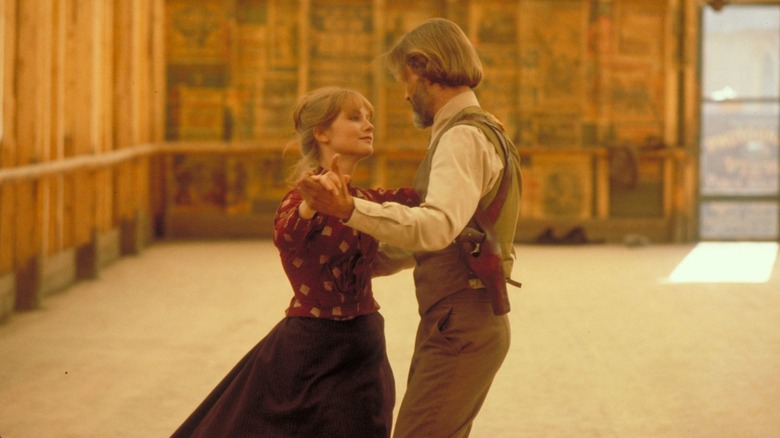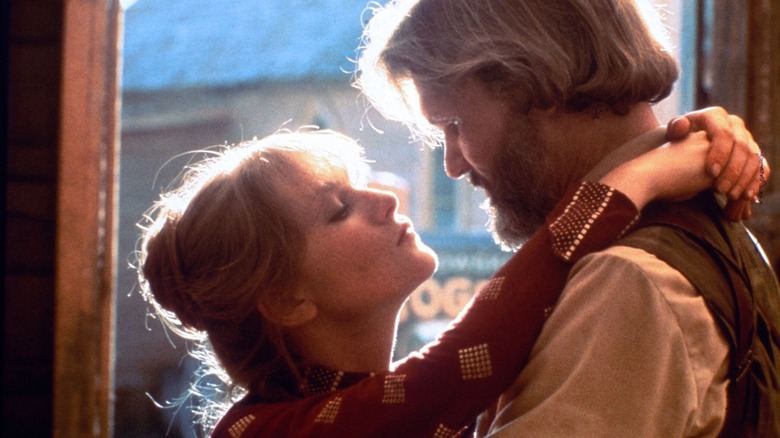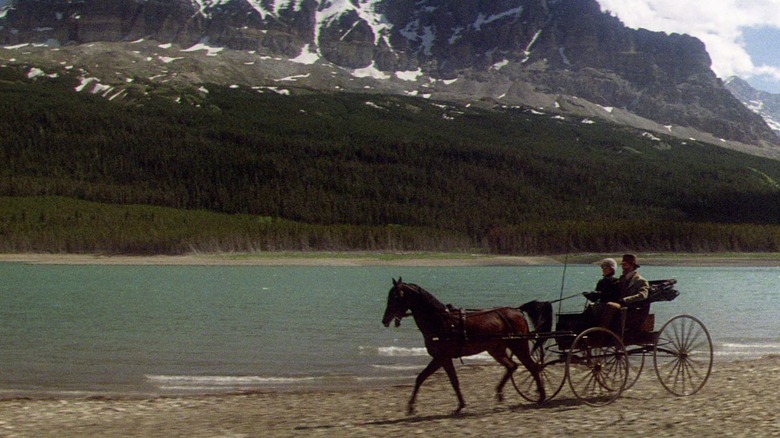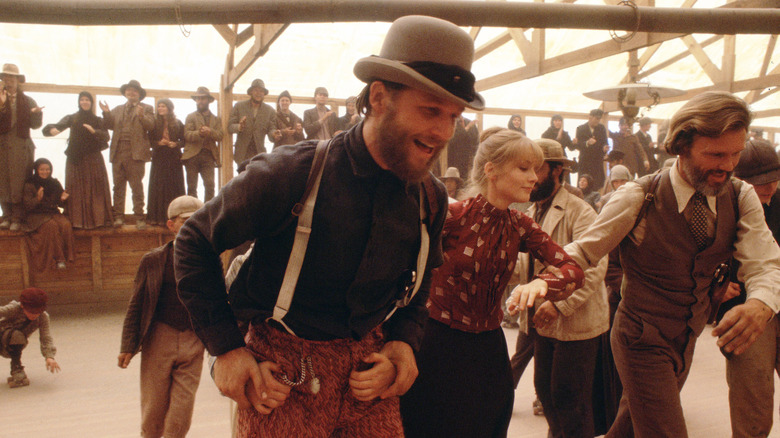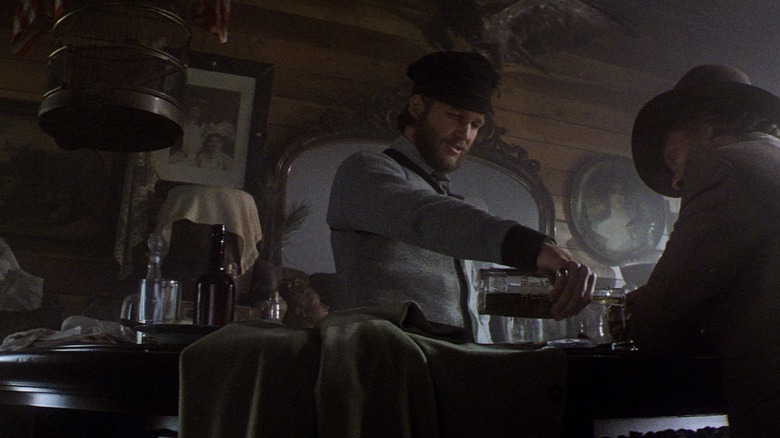How An Oscar-Winning Director Killed One Of Hollywood's Most Iconic Studios
The origin of United Artists is well-known to any passingly devoted Hollywood history buff, and it can be found Tin Balio's book "United Artists, Volume 1, 1919 – 1950: The Company Built by the Stars." In 1918, Mary Pickford, Carlie Chaplin, Douglas Fairbanks, and D.W. Griffith — four of the biggest celebrities of their time — felt something fishy was happening with each of their respective studio contracts. Each of their tenures was due to end soon, and none of them had yet received any offer of renewal. In order to find out what was happening, the quartet hired a private investigator (!) to look into what was going on. The P.I. found that the separate companies that each of them worked for planned on a giant merger, which would lock in standard five-year contracts.
The stars were not interested in such shenanigans and elected, instead, to simply form their own production company. As it was founded by artists, they logically called the company United Artists (UA). The company quickly became a major Hollywood player, with its first released film being Griffith's 1919 Lillian Gish vehicle "Broken Blossoms," and the first film made entirely under their auspices followed in the form of "His Majesty, the American" starring Fairbanks.
UA, selling itself as a creator-oriented studio, churned out scads of hits in the ensuing decades and seemingly showed no signs of slowing. Even as its founding members passed on, UA continued to produce a long string notable commercial hits... until they crashed into a wall in 1980.
One of film history's most notorious bombs — Michael Cimino's "Heaven's Gate" — proved to be such a high-profile disaster that UA more or less tanked entirely. The studio was bought by Metro-Goldwyn-Mayer in 1981. Incidentally, Amazon bought MGM in March of 2022.
Heaven's Gate
There were box office bombs prior to "Heaven's Gate," of course — Anthony Mann's 1964 epic "The Fall of the Roman Empire" lost about $112 million in 2022 dollars — but nothing had managed to achieve the mythic level of failure that the film achieved. Indeed, if "Heaven's Gate" is mentioned at all anymore, it's only in the context of its own financial failure. Despite multiple films having surpassed it in terms of raw dollars lost — "Onward," "Mulan," "Jungle Cruise," "Moonfall," "Turning Red" and "Wonder Woman 1984" all handily outstrip it — "Heaven's Gate" still carries its albatross-like reputation around its neck, largely because its failure led to the crash of a 60-year-old studio.
The story of the making and unmaking of "Heaven's Gate" is detailed at length in Steven Bach's 1999 book, "Final Cut: Art, Money, and Ego in the Making of Heaven's Gate, the Film that Sank United Artists."
The first strike against "Heaven's Gate" was its enormity. The film sported a budget of $44 million, an overwhelming sum at the time, equivalent to about $150 million today. Additionally, "Heaven's Gate" was notoriously long, with some reports clocking the initial workprint coming in at about five and a half hours. The film was eventually released at a mere 219 minutes, although that version would be yanked from theaters after only one week and cut again, this time down to a relatively paltry 149 minutes.
Its budget and its length had audience immediately wary of hubris.
What's Heaven's Gate about again?
"Heaven's Gate" marked the end of an era in American filmmaking. The 1970s were famously a time of ascendency for a generation of filmmakers who were raised in film schools. American directors like Francis Ford Coppola, Steven Spielberg, Martin Scorsese, Brian De Palma, William Friedkin, and George Lucas were reshaping the way movies were made and, in Spielberg's case, distributed. Many film schools today will continue to tout this era, as it marked a rise in filmmakers with a notable style and personal visions that skewed toward craft and toward dark, violent places. Cimino's "Heaven's Gate" locks neatly into the tail end of that movement, as it was that rarest of animals: the big-budget prestige picture.
Set in the 1890s, "Heaven's Gate" is a western about a man named Jim Averill (Kris Kristofferson) who passes through a small town in Wyoming where there is much afoot. While there, he teams up with the local lawman Champion (Christopher Walken). There is a lot of cattle rustling, and a mysterious plot to hunt down and kill over 100 settlers. Isabelle Huppert plays a woman who is in love with both the leads. Brad Dourif, Sam Waterston, and John Hurt also appear. It was a film full of glorious mountain vistas, presented within a reconstructionist genre essay, and featuring a top-notch cast. It was all set up to be an Oscar darling
Indeed, Cimino had just come off the 1978 Oscar darling "The Deer Hunter," which was nominated for nine Academy Award, and won three, including Best Picture, Best Director, and Best Supporting Actor. "Heaven's Gate" was poised to be big.
Hubris preceded it, scandal rocked production, and bad reviews followed.
Animal cruelty
Although the film contains a lot of cattle rustling and some horse performances, the American Humane Association was barred from the set. In 1980, the AHA was not yet a regular presence on film sets, and their being forbidden to oversee "Heaven's Gate" raised a lot of red flags. On the AHA website, it has been alleged that "Heaven's Gate" staged actual cockfights, that many horses tripped, and that one horse was allowed too near a dynamite explosion. It was also alleged that cattle were cut in order to smear real blood on the actors instead of stage blood. There were additional rumors that cattle were also being gutted in order to provide the film with real-life gore, but those rumors were unsubstantiated by the AHA.
The AHA staged protests, and "Heaven's Gate" was picketed when it opened. The protests certainly didn't help the film's popularity, and audiences stayed away in droves. It was the scandal on "Heaven's Gate" that led to the AHA being regularly hired to oversee animal safety on film sets. It was "Heaven's Gate" that dictated the now-common disclaimer that "No animals were harmed in the making of this motion picture."
"Heaven's Gate" was also not beloved upon its release. Critics blasted the flick, calling it ugly and turgid. Roger Ebert famously called it one of the visually ugliest films he had ever seen, saying "[Cimino is] trying to demystify the West, and all those other things hotshot directors try to do when they don't really want to make a Western." He compared it unfavorably to another too-long western bomb, "Paint Your Wagon." Vincent Canby of the New York Times also trashed the film, calling it a ship that sank as soon as it was christened.
A tenth of its budget
"Heaven's Gate" made about $3.5 million worldwide on its $44 million budget. Its clunky self-importance might be seen as a turning point in the trend toward heady, auteur-driven cinema of the 1970s. This, combined with the rise of commercially viable fantasy entertainments like "Star Wars" and "Superman," saw the industry shift very generally away from adult dramas and toward effect-focused kid-friendly fare. "Heaven's Gate" shut the gate. And while adult dramas did continue to be made — and always will, of course — the 1980s are viewed by many pundits as the decade of fantasy/comedy blockbuster films like "Ghostbusters" and "Back to the Future." It's rare that more grown-up fare like "Ordinary People" or "Terms of Endearment" are considered near the top of the decade any longer. Kids took over.
The film lost so much money — something to the tune of $133 million in 2022 dollars — that United Artists faltered. The next year, MGM bought them out.
"Heaven's Gate" has, in recent years, been met with a small amount of critical reappraisal. Given the film's story about the U.S. government tacitly approving of the killing of immigrants, "Heaven's Gate" feels strangely timely in the post-Trump era. "Heaven's Gate" eventually made its way into the Criterion Collection, lending it a certain classy imprimatur. At the very least, "Heaven's Gate" may be worth watching just to see what a film that hobbled a decades-old studio and inspired animal cruelty laws looked like. What was this thing that shifted the world away from adult dramas for a decade? Fire up the popcorn, and prep for the long haul.
